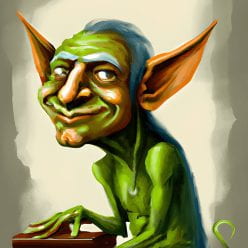Is forgery art?
What a question to begin with I want to clarify that what Wolfgang did was criminal and that his imprisonment was justified, not for imitating art but instead for scamming the purchasers of his pieces.
In my opinion Wolfgang’s imitations were no different than alternate pieces of art despite the intention to deceive and scam consumers. This is specific to Wolfgang however because his “forgeries” weren’t actual forgeries they were unique pieces just made in the style of the artist. Despite his nefarious intention its hard to argue that his pieces lacked originality because they didn’t exist prior to his painting just the styles he used were uninspired. However I believe that with his ability to imitate any style Wolfgang essentially had his own style. Along the lines of a jack of all trades is a master of one but always better than a master of none, Wolfgang’s strength was in his versatility. His imitations are art in their own right because despite the intention despite the imitation of style his works ultimately were original. Original enough to be displayed in museums and fool art experts. Does them being imitations remove their originality? No, if anything the fact they’re so convincing adds to their authenticity. Art is subjective and if these art experts could not discern the imitations from the original artists, and if they could manage to find a meaningful message in a piece of Wolfgang’s art then it is art.
As for the question of value I don’t have much to say. It’s impossible to argue that the value of art is mainly based on the object in question. A banana on a wall sold for $6.2 million. That’s insane for an extremely low effort and gimmick-y piece of art. But what about classic paintings? I wholly believe their value is in the artist and age of the piece. That’s the reason the value plummets once it’s revealed to be a Wolfgang work, is the piece any different? No. Is the cost of making the painting and time put into it less? No. The value wholly comes from the fact that it was painted by a famous man and people say it’s worth that much. If the value of art was solely based upon the object itself and how good it looks there would not be famous names but solely famous pieces. Because a no-name artist is capable of making a masterpiece but without critics proclaiming it a masterpiece it’s essentially worthless and wont be given a value that corresponds with the quality.
It’s because of these reasons that I believe that Wolfgang’s art is art despite his intentions. Because at the end of the day art is subjective, until his pieces were discovered to not be from the original artists they were worth millions. So now is his art any less art? No it’s still art, it’s just not worth millions because of what people think it is, Art is art despite the intention even the worst drawing is art. And if all of the sudden someone needs a tax cut and gets a mediocre piece appraised as millions and then donates it, suddenly it’s a masterpiece. Imitation is art, originals are art, every piece is art. Something is only worth millions when someone says it is.
Golly I dislike the value of art so much the price of that aforementioned banana could let someone live a comfortable life if they used the money correctly but nah, let’s spend it on a banana.
